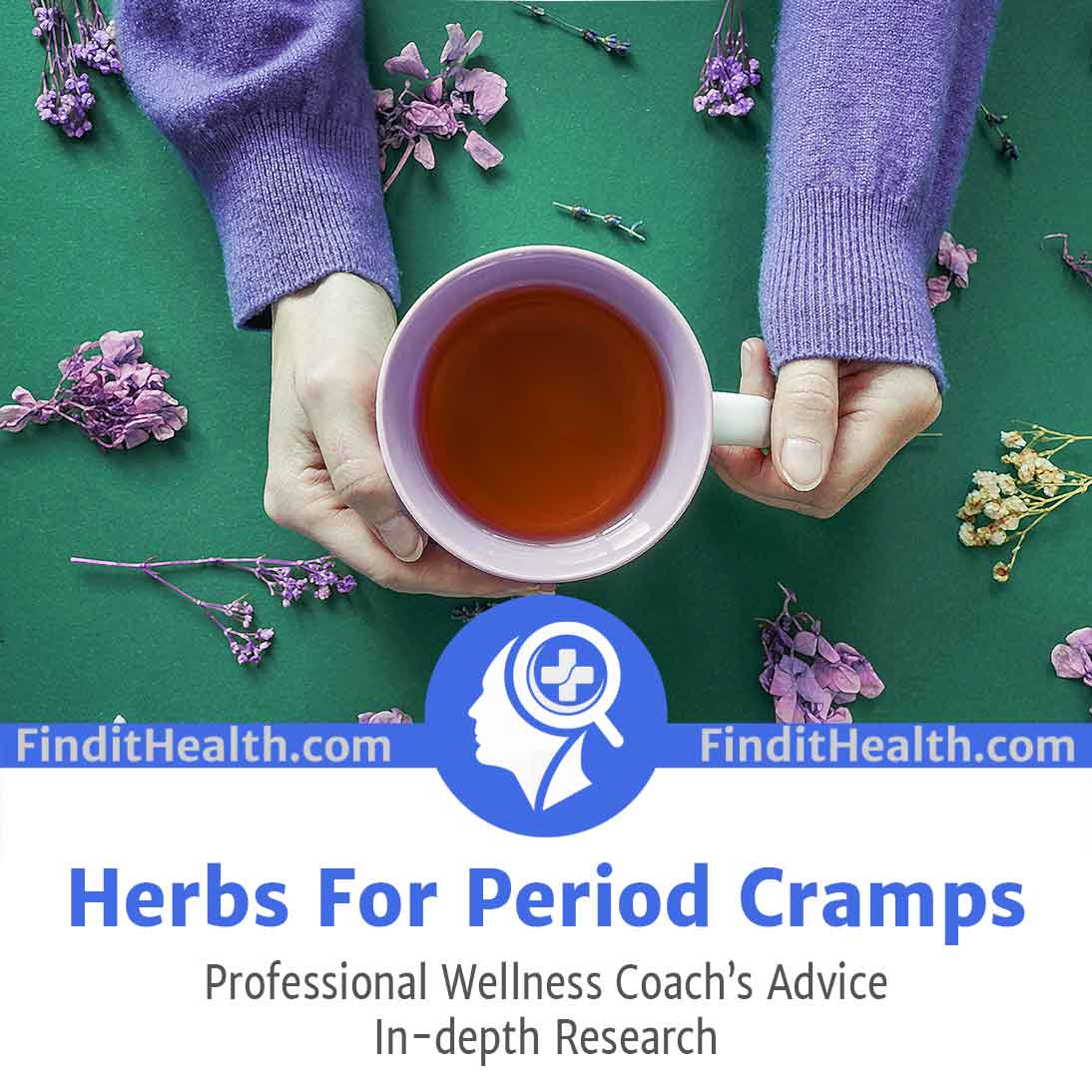
As head of the wellness coach team at Find It Health, our commitment is to provide you with evidence-based information to make informed health decisions.
The journey of womanhood comes with its unique challenges, not least of which are menstrual cramps. While many seek relief through conventional treatments, the potential of natural herbs is increasingly becoming a topic of interest.
Based on a study by Mirabi, P., Alamolhoda, et al. (2014)., several herbs have been proven to be effective in reducing period cramps.
Each recommendation stems from thorough analysis, and by the end, you’ll be well-equipped with knowledge on the best herbal interventions for menstrual relief.
What Herbs Relieve Menstrual Cramps?
The menstrual cycle is a natural, recurring process that the majority of women experience. With it often comes menstrual pain, commonly referred to as period pain.
This discomfort is a primary concern for many, with some experiencing it more intensely than others.
Fortunately, the field of herbal medicine offers promising solutions to mitigate this discomfort. Let’s break it down:
1. Ginger: A commonly used kitchen ingredient, ginger has long been recognized in herbal medicine for its multiple health benefits. Particularly concerning menstrual cramp pain, ginger’s anti-inflammatory properties can play a pivotal role. These properties aid in reducing the production of prostaglandins, which are the primary culprits behind menstrual pain.
2. Chaste Tree Berry (Vitex): This herb has shown efficacy in balancing hormones during the menstrual cycle. By doing so, it can substantially decrease menstrual pain. Its effects on the pituitary gland help in regulating the menstrual cycle, ensuring that period pain is less severe and more manageable.
3. Chamomile: A popular tea choice, chamomile is more than just a soothing drink. It boasts anti-inflammatory properties that can be highly beneficial for those suffering from menstrual cramp pain. The herb’s muscle-relaxant attributes can also provide relief, ensuring that the uterine muscles do not contract too intensely.
4. Raspberry Leaf: Often overlooked, raspberry leaf is an excellent herbal remedy for menstrual pain. By toning the pelvic muscles and regulating blood flow, it can reduce the severity of menstrual cramps. Its tannins, which have a relaxing effect on the uterus, are especially helpful during the menstrual cycle.
5. Fenugreek: An ancient herb, fenugreek can be a boon for those grappling with period pain. Its potent anti-inflammatory properties and ability to improve blood flow make it a suitable candidate to tackle menstrual cramp pain. Regular consumption of fenugreek seeds, whether in the form of a decoction or as a dietary supplement, can help alleviate the distress associated with menstrual cramps.
6. Turmeric: With its active compound, curcumin, turmeric has a strong anti-inflammatory property that can provide relief from menstrual pain. Adding turmeric to meals or consuming it in the form of a warm drink can ensure its bioactive compounds get to work, reducing inflammation and promoting a healthier menstrual cycle.
7. Cramp Bark: As the name suggests, cramp bark is another noteworthy herbal medicine for alleviating period pain. It functions as a muscle relaxant, particularly targeting the muscles of the uterus. By preventing excessive muscle contractions, it can minimize the pain experienced during the menstrual cycle.
Incorporating these herbs into one’s regimen can pave the way for a less painful menstrual experience. However, it’s essential to approach herbal medicine with an understanding of individual needs and any potential allergies or interactions.
SUBSCRIBE for FREE STRESS MANAGEMENT TECHNIQUES from our EXPERT COACHES!
Mechanism For Period Pain
At the root of period pain lies primary dysmenorrhea. This is the technical term for the common menstrual cramps experienced by women, especially during their teenage years. So, what causes primary dysmenorrhea?
The mechanism further involves hormone-like substances called prostaglandins.
These prostaglandins trigger the uterine muscle contractions. Apart from that, certain women may experience heavy bleeding, which can augment the pain due to increased uterine contractions.
While primary dysmenorrhea is more common, it’s always essential to consult a healthcare provider to discern the underlying cause of severe or prolonged pain.
So, how can one address or manage this pain?
- Heating Pad: One of the most traditional and effective methods is using a heating pad. Heat helps to relax the contracting muscles in the uterus, offering relief from cramps. A warm bath can also provide similar soothing effects.
- Anti-Inflammatory Herbs: Nature has bestowed us with numerous herbs known for their anti-inflammatory properties. These herbs, when ingested, can alleviate pain by reducing inflammation. Turmeric, for instance, is an anti-inflammatory herb that can help diminish period pain. Still, always consult a healthcare provider before introducing new herbal remedies.
- Over-The-Counter Pain Relievers: Non-prescription pain-relieving medicines can be beneficial. They not only reduce pain but also lower the production of prostaglandins, subsequently reducing the severity of the cramps. It’s crucial to take these medicines as directed and ensure they don’t interfere with any existing medications or conditions.
- Lifestyle Choices: Regular exercise, even light activities like walking, can help. Physical activity releases endorphins, which act as natural painkillers. Additionally, avoiding smoking, reducing alcohol and caffeine intake, and maintaining a balanced diet can contribute to alleviating menstrual pain.
- Consultation: While period pain is a common experience, there’s a threshold to what’s considered normal. If the pain is incapacitating or extends beyond the first few days of menstruation, consulting a healthcare provider is paramount. They can offer guidance, run necessary tests, and recommend suitable treatments.
SUBSCRIBE for FREE STRESS MANAGEMENT TECHNIQUES from our EXPERT COACHES!
Chinese Medicine For Period Cramps
While modern medicine offers several solutions, Chinese medicine, rooted in ancient wisdom, has provided relief for centuries.
Several strategies within Chinese medicine are employed to combat period cramps:
- Acupuncture: Acupuncture, the practice of inserting thin needles into specific body points, is a hallmark of Chinese medicine. For menstrual pain, the needles are placed in areas that stimulate energy and blood flow, dispelling stagnation. Many women report relief from pain and improved menstrual flow post-acupuncture sessions.
- Chinese Herbal Formulas: These formulas, often tailored to the individual, are combinations of natural ingredients that work synergistically to restore balance. Common herbs for menstrual pain include:
- Dang Gui: Known to invigorate blood and harmonize vital energy.
- Chuan Xiong: Helps in promoting blood circulation and dispersing blood stasis.
- Bai Shao: Alleviates pain by nourishing the blood and regulating menstrual flow.
- Dietary Recommendations: In Chinese medicine, diet plays a pivotal role in overall well-being. For menstrual health, it’s advised to consume warming foods (like ginger or cinnamon) that stimulate blood flow. Conversely, cold foods (like raw vegetables) might exacerbate stagnation and should be consumed in moderation.
- Moxibustion: A lesser-known but effective technique where dried mugwort (moxa) is burned near specific points of the body. The warmth from moxibustion can invigorate Qi and blood, alleviating pain.
- Tui Na Massage: A specialized massage technique focusing on the abdominal area. Tui Na helps in breaking up stagnation and promoting smoother menstrual flow.
However, like all treatments, it’s crucial to approach Chinese medicine with due diligence. Always consult with a certified practitioner who can guide based on your specific symptoms and history.
Frequently Asked Questions
What is the best herb for period pain?
The best herb for period pain is often considered to be cramp bark. Its antispasmodic properties help in relaxing uterine contractions and relieving pain.
What helps menstrual cramps naturally?
Natural remedies for menstrual cramps include applying a heating pad to the lower abdomen, practicing yoga or meditation, drinking ginger or chamomile tea, and using essential oils like lavender or clary sage for massage.
What is the Chinese herb for menstruation?
Dang Gui (Angelica sinensis), commonly known as Chinese Angelica or Female Ginseng, is a frequently used Chinese herb that aids in regulating menstruation and alleviating menstrual discomfort.
What can I take for stress while pregnant?
Chamomile tea and lemon balm tea are often recommended for their calming properties. However, always consult with a healthcare provider or nutritionist before adding any herbal teas to your diet during pregnancy.
What herbs block prostaglandins?
Herbs such as turmeric and ginger possess anti-inflammatory properties and are believed to help in reducing the production of prostaglandins, which can alleviate menstrual pain.
Conclusion
In light of the comprehensive research conducted by Find It Health, it’s evident that herbal remedies have a significant role in managing menstrual discomfort. Our detailed exploration into traditional practices and contemporary studies underscored the potential of herbs in offering relief from period cramps.
Not only do they present an organic alternative to over-the-counter painkillers, but they also harmonize the body’s natural flow. As with all health solutions, it’s imperative to consult with a healthcare professional when considering herbal treatments.

